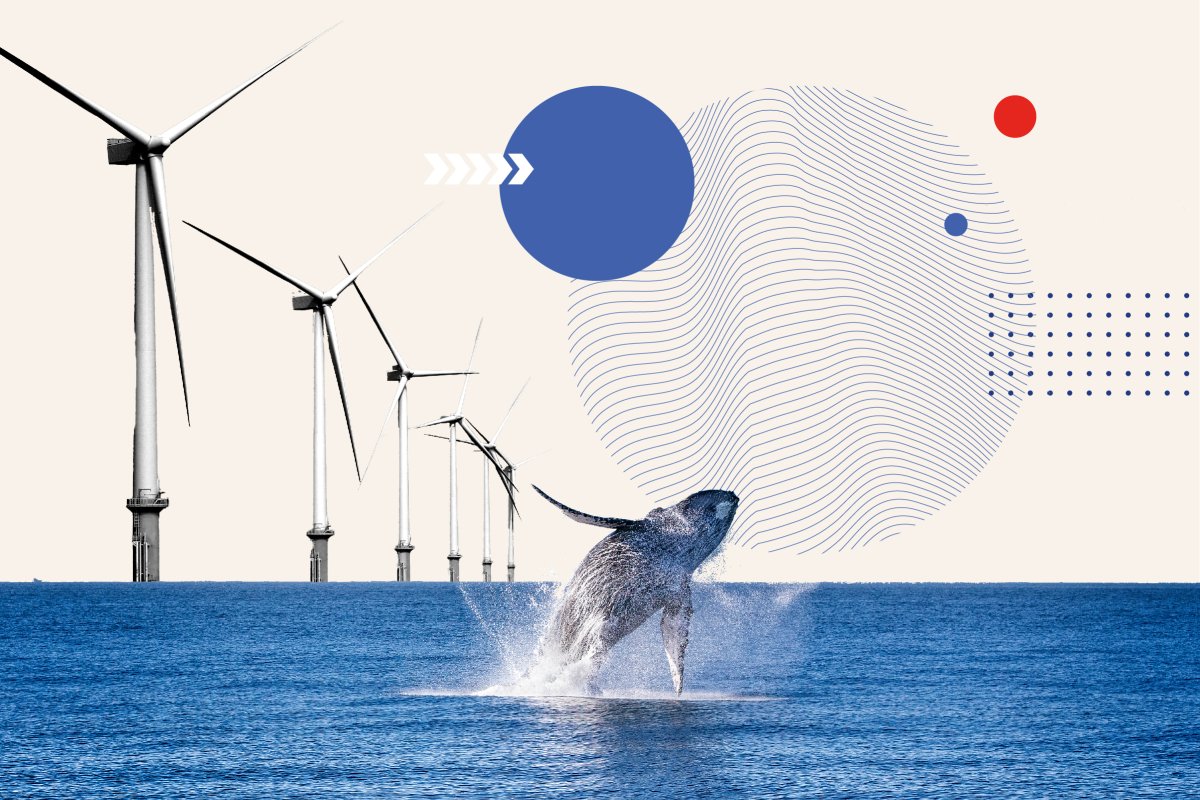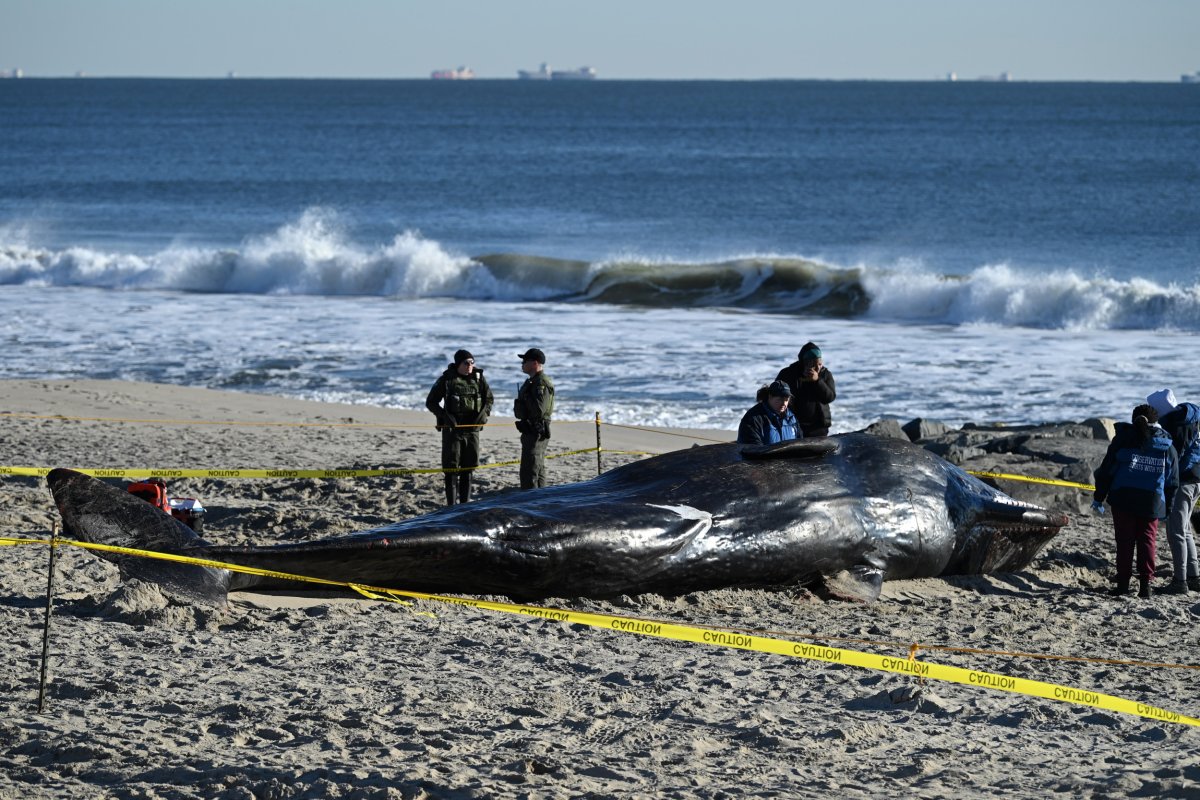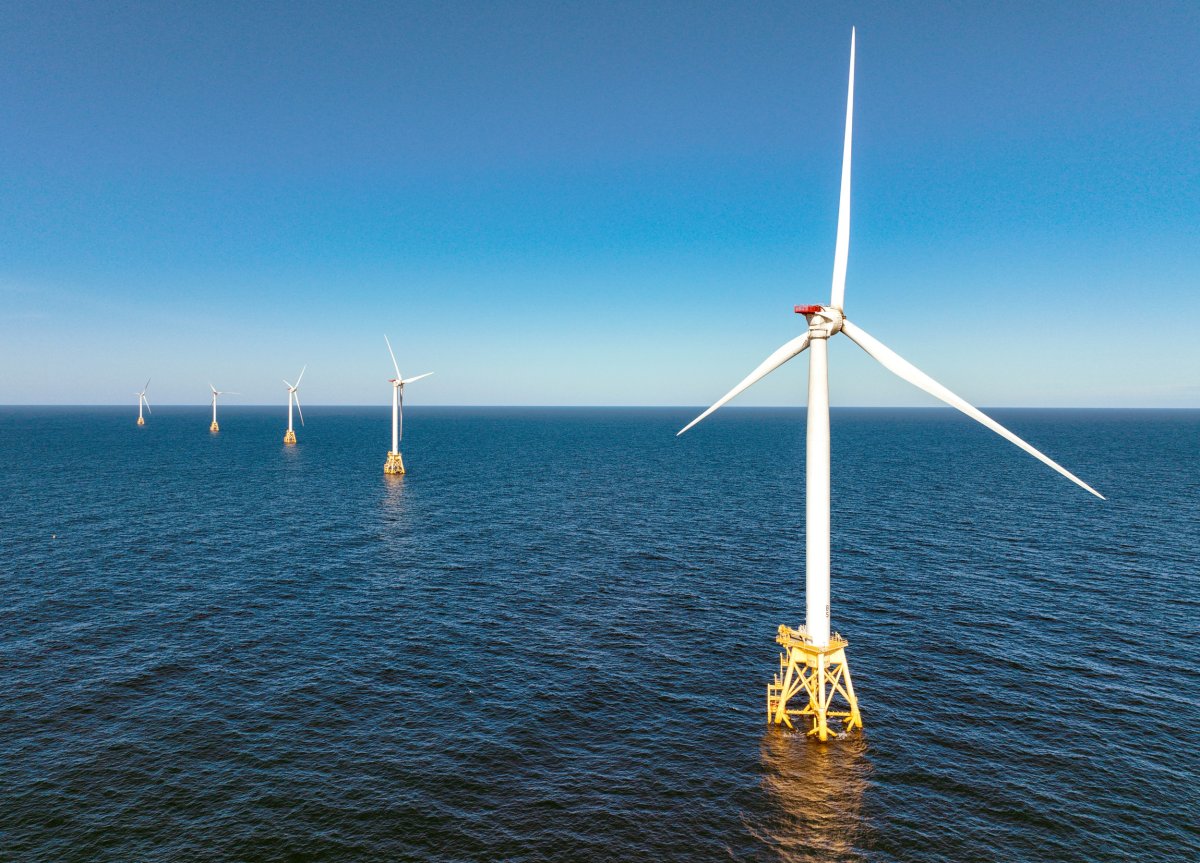- Recent whale deaths along the East Coast have prompted Republican lawmakers to call for a moratorium on offshore wind projects.
- Environmentalists, such as Clean Ocean Action, have also joined in, citing the need to investigate the cause of the whales' deaths.
- Experts suggest the cause is likely human-made, such as shipping traffic or sonic mapping before wind farm construction, rather than the wind farms themselves.
- The debate has become polarized, however, with some seeing the whale deaths as a proxy for a wider debate on clean energy.
In recent weeks, Republicans have joined forces with some unlikely allies: environmentalists. What has united members of two usually disparate camps is the issue of offshore wind, and specifically claims farms on the East Coast may be impacting the marine wildlife there.
Around 30 whales have been found to have died since December, and some critics have pointed the finger at wind farms that either have been built off the coast of states, such as New York and Delaware, or are in the planning process. Federal officials have denied that the whale deaths are linked to the wind farms, but others argue they may cause unseen harm to aquatic mammals.
The deaths have prompted several Republican members of Congress to introduce a resolution on March 21 that seeks a moratorium on new projects and "conduct investigations to determine the true impacts of offshore wind development."
Experts say that while there may be some impact to the marine environment from offshore wind, the much greater threat to aquatic wildlife is climate change. Climate change contributes to habitat loss and changes in food sources for whales, which are particularly vulnerable to its effects as they sit towards the top of the food chain.
Questions have also been raised about negative impacts offshore wind could have on local economies, but experts argue that the whale deaths are being used to make broader political points.

The Whale Deaths
It's a cold, bright winter's day on Rockaway Beach, in the Queens borough of New York City, on December 13. Local residents look on, wrapped in warm coats, as state and federal officials assess a body lying on the sand—except this isn't C.S.I., and the body is 23 feet long. Blood is visible around the mouth and on parts of the body of a sperm whale, stranded on the beach, as police officers establish a cordon.
"Whales are a charismatic mammal, so the strandings are dramatic," Roger Karapin, a professor of environmental policy at the City University of New York, told Newsweek. "This creates not the most rational or reasonable public debate that you get when you have a charismatic mammal involved, but it's part of the democratic process to put an issue on the agenda so it can maybe be discussed in a more reasonable way."
On March 29, a spokesperson for the National Oceanic and Atmospheric Administration (NOAA) told the Associated Press that it had recorded 30 whale deaths since December 1—including 21 humpback whales, three sperm whales and two North Atlantic right whales. The NOAA said the number was higher than usual.
The deaths had already been picked up on social media, and in some news outlets. Then Republican representatives Jeff Van Drew of New Jersey and Andy Harris of Maryland introduced the resolution calling for a moratorium on offshore wind.

"Attention is finally being drawn to the industrialization of our coastline because of these tragic whale deaths," Van Drew said in a statement. "Not a single concern has been raised by our president or environmentalists."
The Republican congressmen have been joined by some environmentalists, though. Clean Ocean Action, a New Jersey-based conservation organization, is in favor of the moratorium. Cindy Zipf, the group's executive director, told Newsweek it wants a halt to activity "until an investigation is complete into why whales and the dolphins have been dying and to make sure it's nothing to do with the intense amount of offshore wind pre-construction activity."
However, federal officials both at the NOAA and elsewhere have said they have found no evidence of the whale deaths being linked to offshore wind activity. Benjamin Laws, a conservation official at NOAA, told a January 18 press conference: "I want to be unambiguous: there is no information supporting that any of the equipment used in support of offshore wind development could directly lead to the death of a whale."
Harris questioned this argument. "While NOAA insists that they have no scientific evidence pointing to offshore wind energy projects as the proximate cause of death, they offer no scientific evidence proving that these projects are not contributory causes of death," he said.
The Theory
"In the case of the marine mammals, it's not at all clear what this impact is coming from, from the [offshore] wind industry," Karapin says. "Right now, the only thing they're doing is some sonic mapping, and it hasn't really been demonstrated that's causing any problems—but it could, so I think it could be investigated."
Mark Nelson, founder of consultancy Radiant Energy, told Newsweek he has heard from others with expertise in the field that the sonic mapping of potential wind farm sites is a possible "hypothesis" as to why the whale deaths are occurring.
"A wind farm has activities before construction, like surveying for [the] seabed shape and material," he said, adding that while it is unproven that this was impacting aquatic mammals, such sonar technology can be "extremely disruptive" and "these are mammals that rely on sonar and sound to function socially and in terms of food."
"That's what may be possibly driving some of these extremely scarce and endangered mammals into destructive encounters with either the shoreline or working ships, like tankers and cargo ships," Nelson added.
There is "no evidence linking site preparation work for offshore wind farms with a number of whale deaths along the U.S. East Coast," Brady O'Donnell, a spokesperson for the Marine Mammal Commission, told USA Today.
However, a letter written to Brian Hooker, lead biologist at the Bureau of Ocean Energy Management, from Sean Hayes, chief of protected species at NOAA, in May 2022 said of whales: "The development of offshore wind poses risks to these species, which is magnified in southern New England waters due to species abundance and distribution."
"Additional noise, vessel traffic, and habitat modifications due to offshore wind development will likely cause added stress that could result in additional population consequences to a species that is already experiencing rapid decline," he added, calling for impact assessments of the projects off the New England coast.
Zipf said this explanation was "plausible" given that no other explanation seemed apparent, adding that the National Marine Fisheries Service gives permits that recognize the harm sonar mapping can have on marine mammals.
That said, there have been a heightened number of whale deaths in recent years that pre-date some of the offshore wind farms and much of the current activity. The NOAA has listed several "unusual mortality" events for whale species on the Atlantic coast since 2016, with the highest number of humpback whale strandings occurring in 2017.
"Despite what Republicans are trying to do with the issue, there are real concerns about how it's done—how offshore wind is developed—and there are definitely negative impacts," said Karapin. "So I think the debate is healthy for environmental policy, for the impacts to be acknowledged and to be investigated, and for mitigation measures to be pursued."
The offshore wind industry is taking some protective measures. Jason Ryan, a spokesperson for the American Clean Power Association, told Newsweek that "on any offshore wind work that's taking place, on board the vessels there are protected species observers," who, if they see a marine mammal in proximity to the work, will "shut down the work that they're doing."
Zipf said, though, that the surveying vessels also use acoustic equipment such as sparkers and boomers, which "penetrate deep into the sea floor." She added that she was aware of occasions in which multiple vessels had been surveying in the same area at the same time, and fears of the impact pile-driving activity might have.
"What's killing these whales is vessel strikes and fishing gear entanglement—that's known," Karapin said. "Since 2016, there's been an increase in these deaths, and that's before anybody was thinking about pursuing these projects along the East Coast. They certainly weren't doing any sonic mapping; they were doing nothing." He suggested that increased shipping traffic may be responsible for the deaths.
The Political Response
Both Karapin and Nelson said that there is local opposition to offshore wind farms for good reasons, with local interests usually at the heart of those complaints. As well as potentially interfering with fishing, there are fears they detract from tourism that is the lifeblood of some coastal communities.
"The interesting thing about wind farms is they unite such disparate political groups," Nelson said. "Like people who would cut each other's throat in almost every other area of politics stand side by side each other as soldiers when it comes to local offshore wind."
But in this case, the conflict has "been folded into the culture wars," Karapin said. The speed with which Republicans have laid the blame on offshore wind, and their insistence that it is the root cause despite official denials, has raised eyebrows about the sincerity of their motivations.
"It's certainly an attempt to drive a wedge between Democrats and one of their base voters," Karapin said. "I think it's also just trying to take this issue of offshore wind development and make it into something Republicans can have a win on by slowing it down, nationalizing the issue."

"They're trying to score a win to pep up their base and they're trying to discourage the Democratic base, getting some of those environmental voters to stay home on election day," he added. "Remember we only have about two-thirds turnout ... so a lot that's at the margins is getting people to vote or not to vote rather than persuading them."
Newsweek reached out to Van Drew's spokesperson via email on Friday for comment.
Harris responded: "I would hope that we could all agree that before we start industrializing offshore the mid-Atlantic Coast we would make certain that we won't be contributing to the extinction of the right whales—or do harm to other marine mammals. They deserve at least that much." Other Republican lawmakers have also since cosponsored the resolution.
Karapin said that there "is a division" within the environmental community over the balance between protecting wildlife and building clean energy sources, a challenge Nelson said "all energy sources have." Karapin said major environmental organizations are largely in favor of offshore wind because "they see climate change as the bigger problem that needs to be addressed," while others, such as Clean Ocean Action, have other priorities.
Zipf said that Clean Ocean Action was "not opposed to offshore wind" but wanted an investigation "to make sure we understand the consequences... so we can try to mitigate any harm that may be caused." She added that there has been a history of bipartisan support for ocean conservation in New Jersey, saying that "it's very unfortunate that the issue has become polarizing."
On Wednesday, Democratic senators from coastal states called on federal officials to address the issue of whale deaths, but conspicuously did not blame or mention offshore wind—further suggesting the whale deaths are being used as a proxy for the debate on the energy source.
"To protect these animals, we must follow the facts and address the known, documented causes of death," Senator Cory Booker of New Jersey told AP, adding that "many of the whales washing up along the Atlantic coast this year have shown evidence of a vessel strike."
Karapin is skeptical that the moratorium would get further than the House, describing it as "symbolic," and added: "This issue is going to go away when it gets replaced by another issue... Tucker Carlson and others will move on, and we won't hear about it very much in a month or two."
UPDATE: 04/04/2023 8:00 a.m. EST: This article was updated for clarity and to provide greater context.
Uncommon Knowledge
Newsweek is committed to challenging conventional wisdom and finding connections in the search for common ground.
Newsweek is committed to challenging conventional wisdom and finding connections in the search for common ground.
About the writer
Aleks Phillips is a Newsweek U.S. News Reporter based in London. His focus is on U.S. politics and the environment. ... Read more
To read how Newsweek uses AI as a newsroom tool, Click here.






